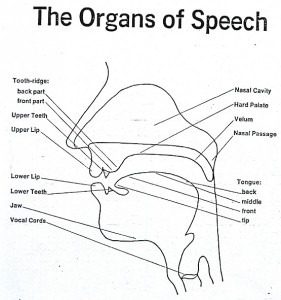Usually within the first few minutes of hearing some speaking to me, I already have an idea of what will be easy and what might be difficult for them in singing. This is not always the case, (some people sing drastically different than they speak) but it’s often the case. This is because your vocal tract (the space inside your throat and mouth) makes certain shapes to make certain vowels, sound qualities, and volumes, the way people shape their vocal tract + their use of air makes certain sounds in singing easier or harder.
Did you know that when you speak English, you use very specific tongue shapes for every single consonant and vowel sound? If you are a native speaker, these tongue shapes got trained at a very young age, and were practiced at below-conscious level. You don’t have to think about HOW to speak a word in English because it’s become unconscious, muscle memory. You could say that you’re “talented” at speaking English, as it just comes easy. You can make the sounds required without much forethought or effort. What does this mean about your ability to teach other people how to speak English, or for learning new vocal sounds in general, and especially those for singing?
This means that unless you’ve take special courses on HOW to speak English, you can’t really teach anyone the sounds you can do. This is the same for singing. This is what singers run into when they try to teach what they can already do, but don’t know how they are doing it. They had some good habits for certain sounds in childhood (like 99% of all babies and toddlers) and they kept a few of them for certain kinds of sounds.
When you start taking vocal lessons, you’ll get to know the areas of your voice that are “talent” (really just muscle memory of good vocal habits) and what areas need “training” to do (new, better-feeling habits repeated enough times to become muscle memory for less used sounds in your voice).
The areas that need training and/or simply unexplored sounds in your voice, will need specific steps to find and put into muscle memory. New sounds don’t take time to realize or notice, but it takes time to remember the new ways of doing something and not go back to old, less-effective ways of making the sounds. So how do we do this?
Take small bites.
When we need to learn a new, better, permanent way to do an activity, we take small bites.
Babies, when they are learning to walk, only take small “bites” out of walking. They try a few steps, fall, try new steps, fall until eventually they are walking more than they are falling. They take breaks and do other random things, then revisiting this new walking thing. They are replacing the old habit of crawling with the new habit of walking. Going into the unknown territory of “walking” seems pretty fun for them to do, because they aren’t aware of failure or success, just the joy of learning something new.
That’s what you can take with you in your practice, small bites that gradually lead to bigger bites. This is the fun AND more effective way of learning how to sing something new. In my Austin studio, we learn what areas of your voice have habits already in place that we need to keep and which ones need to be re-learned, and how to memorize those new habits in small bites. 
You can use this method really for any new habits you’d like to bring into your life.
